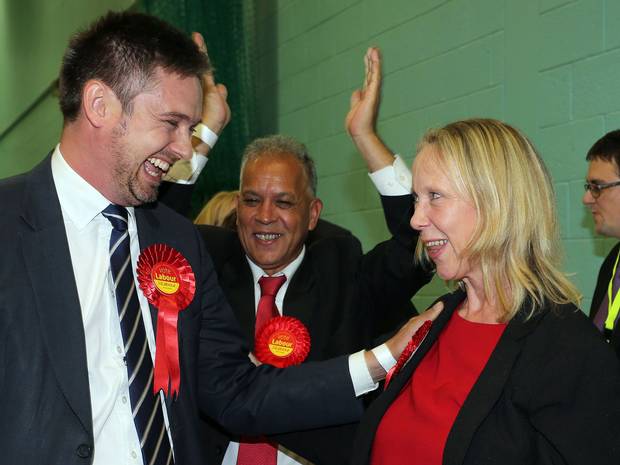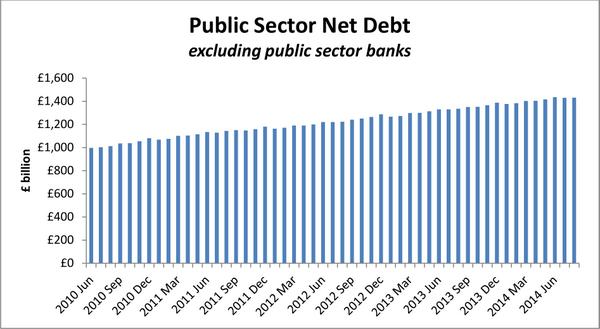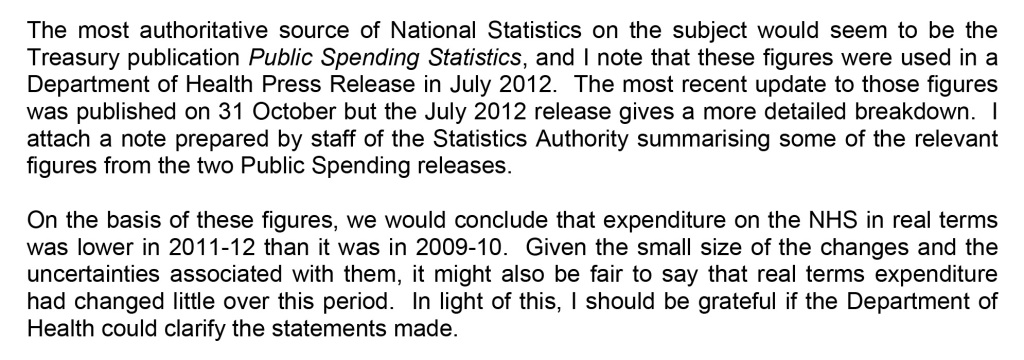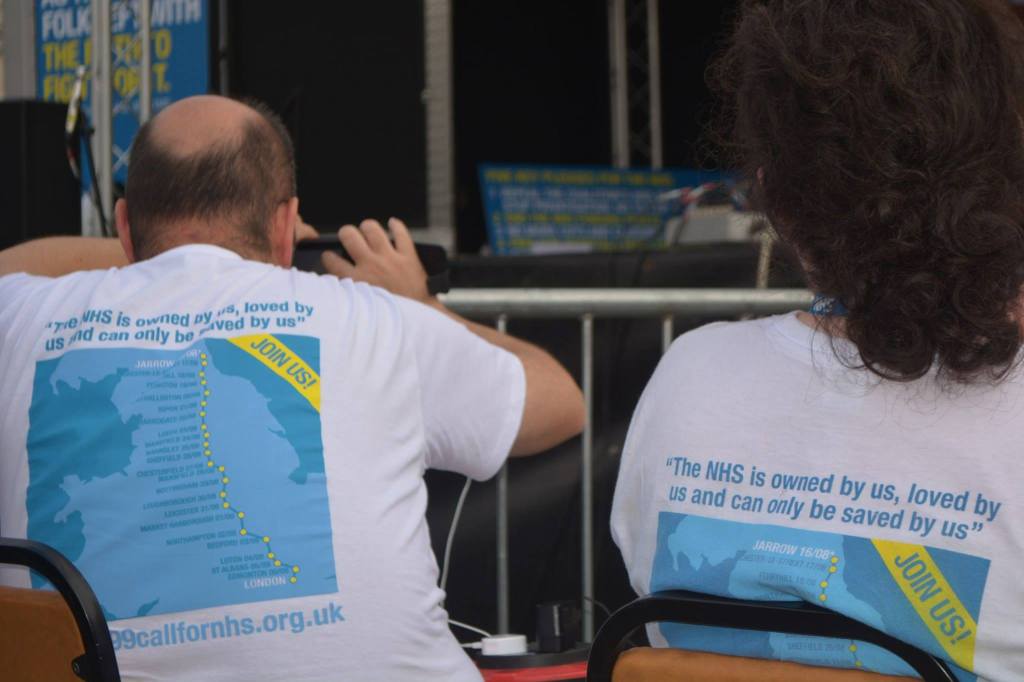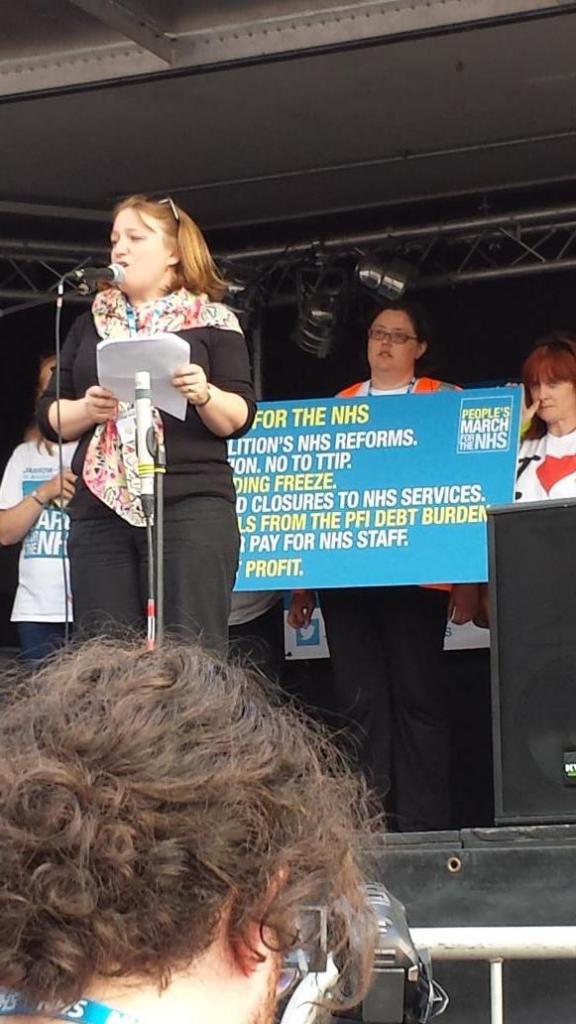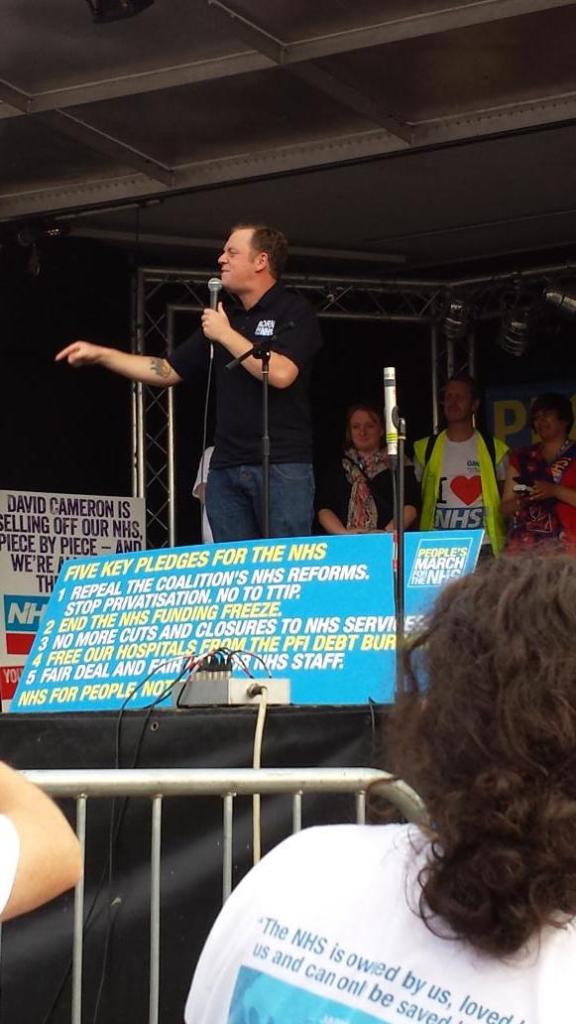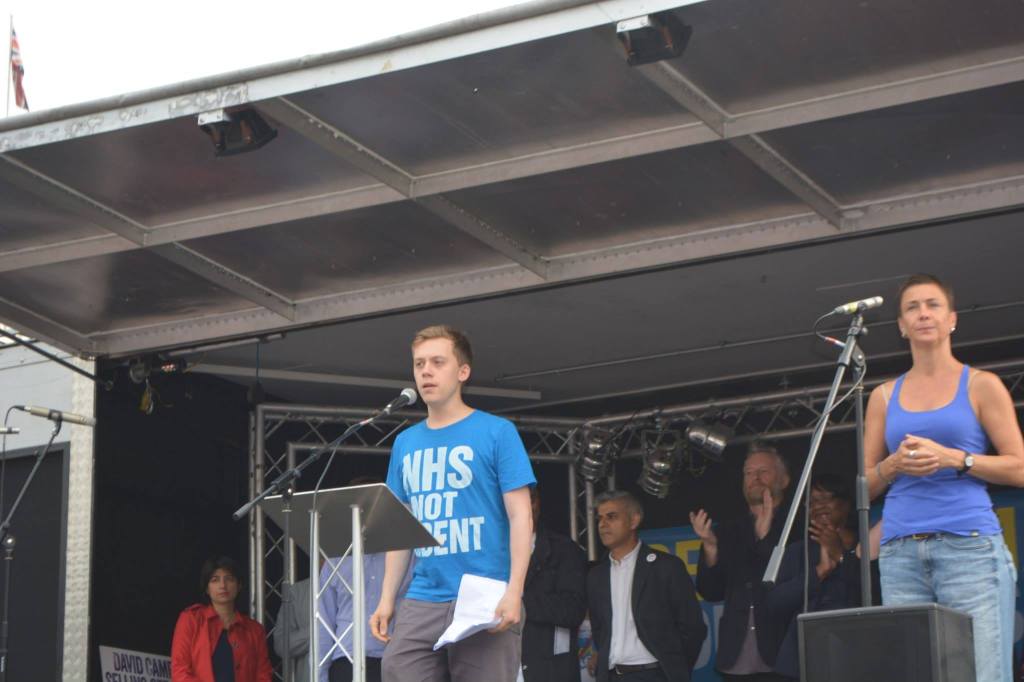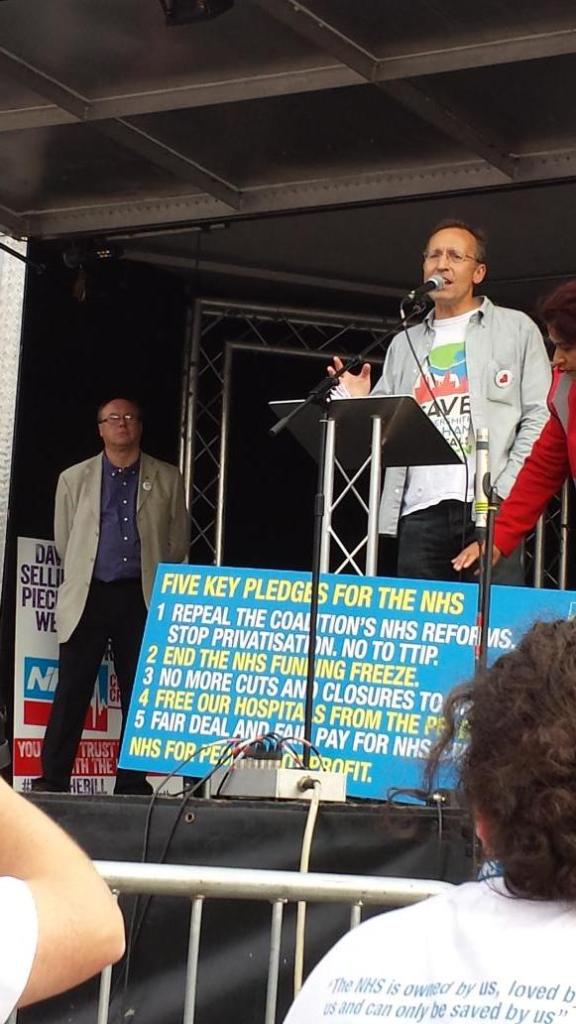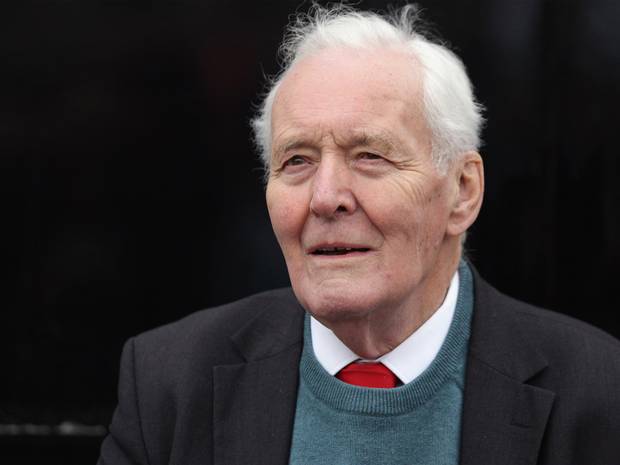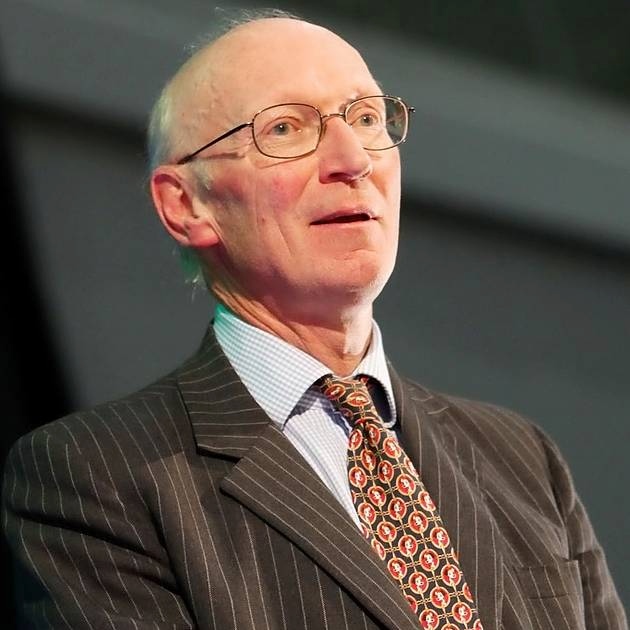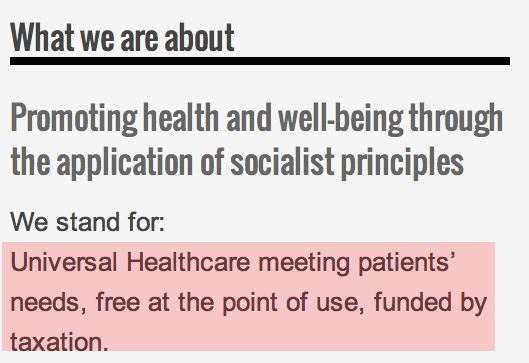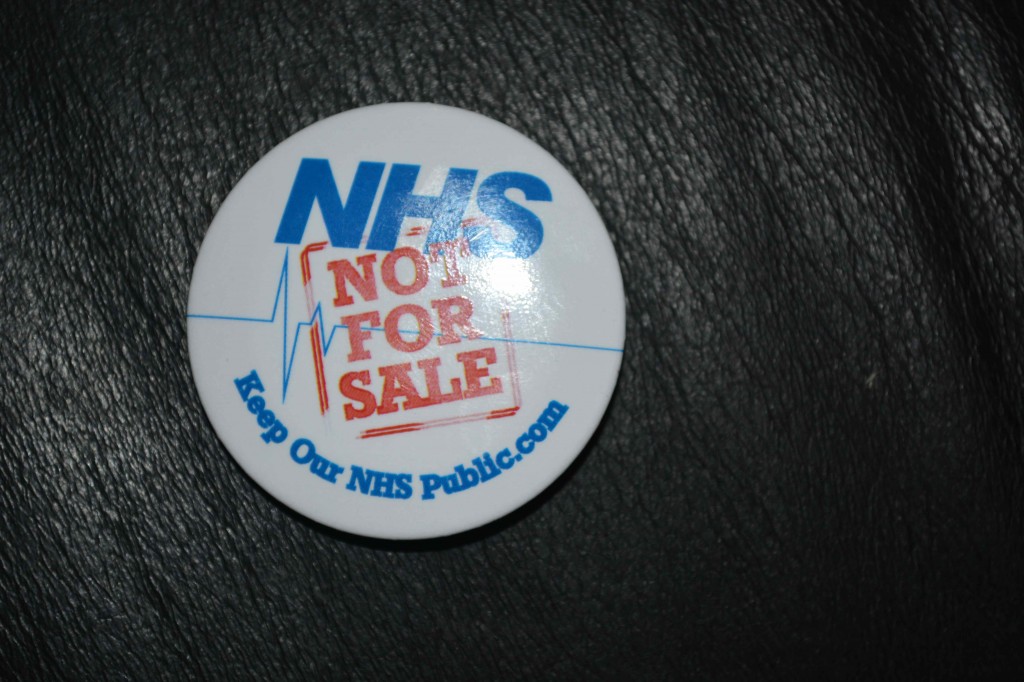Home » Posts tagged 'Socialist Health Association'
Tag Archives: Socialist Health Association
Saving Owen Smith
It’s all been an incredible mess.
Take for example Owen Smith MP talking about the EU referendum with David Dimbleby last thursday on the BBC’s flagship programme Question Time.
DD: You said you would like to see Labour going into the next election saying our party policy is to go back into the EU.
OS: Yes.
DD: You ignore the Brexit vote.
OS: Exactly.
DD: Exactly?
OS: Exactly. We need to find out what it is. The Brexit vote set a direction, if we like. We don’t know where we’re going.
DD: You know where you are going. You are going back in.
OS: Well, I hope we are. And I think we should be strong about that.
You could probably fill an entire blogpost with Owen Smith MP’s greatest gaffes. But this is no time for such hilarity.
The latest journey into the Trump school of campaigning involved Owen Smith MP ‘winning’ at something. Yes – winning at getting married.
Cast your mind back to a long time ago – when Owen Smith MP tried to ‘counsel’ Jeremy Corbyn before launching his leadership bid. That bid was to prove it was all about winning.
Embarrassingly, the man whom Owen Smith MP derides for “not winning” is, according to polls which have been known to be unreliable in the past, perhaps on the brink of winning by a landslide.
For me things got so testy I even wrote a non-abusive tweet complaining about Owen Jones MP!
@chunkymark often refers to ‘the man behind the curtain’. This is a reference to that classic scene in the Wizard of Oz, one of my favourite films.
Here, the man behind the curtain included our so-called friends at the Mirror.
Labour crushed in Sheffield by-election just 3 weeks after huge Corbyn rallyhttps://t.co/HNyiZdnibs pic.twitter.com/lddG5UB3Co
— Mirror Politics (@MirrorPolitics) September 8, 2016
Except the man behind the curtain was shouting above the real story, and was not that impressive after all. 
You name any policy area, and Owen Smith MP has made a mess of it. Owen Smith ended up trying to defend why he wanted to back increasing funding to the failed PREVENT policy, accused of causing further problems for UK muslims, in the Question Time debate last week.
This was reported in “The Canary”
Audience member:
You say definitely Owen, you’re the one that endorsed the Prevent strategy…
Victoria Derbyshire Show, Owen Smith MP in the Labour leadership debate on 11 August:
…consider the issue of terrorism: I’d invest in our communities. The Prevent strategy, that is grossly undermined and under-resourced in this country, ought to be at the forefront of Labour’s policy, making sure we foster better community relations in Britain.
Owen Smith MP says he dislikes slogans, when he has often repeated the same slogans ad nauseam in the live TV debates. He accused voters in TV debates several times, “you’re wrong”, even flying completely in the face of all evidence. He has persistently denied that the orchestrated mass resignation of the majority of the Labour PLP was not contributing to the general poll ratings of Labour.
YouGov tracker shows that Labour *led the Tories* in 3 polls in a row over 41 days *pre-Coup https://t.co/vzqU0QDRkN pic.twitter.com/g3cDrqyZMx — Éoin (@LabourEoin) September 10, 2016
Unsurprisingly the members of the Socialist Health Association had backed Owen Smith. I have experience of that organisation which is the most pale, male, stale and useless Labour-affiliated entity currently in existence, having been of ABSOLUTELY NO USE in criticising policy, such as the outsourcing clause of the Act of 2012 or the private finance initiative. – or about as much use as a chocolate teapot or fireguard, being more generous.
Owen Smith MP’s campaign has been so shambolic it now looks as if, incredibly, it will be worse than Zac Goldsmith’s. And he resoundingly lost. The problem now for the PLP after September 23rd will be try to heal the rifts in the meantime, when this fiasco they have created has diverted news media attention away from Tories fighting like ferrets in a sack over the meaning of #Brexit, the introduction of an ill-thought out and highly divisive policy on grammar schools, and catastrophic financial performance of the NHS as a whole. Members of the parliamentary Labour MP now need to get a grip, or they deserve to be deselected. Had they actually done their job properly, and if Corbyn had lost 2020 monumentally if only because of the boundary changes, they could have easily blamed Corbyn. John O’Donnell MP has signalled that he and Jeremy would not be sticking around if Labour lost in 2020, but at the moment the parliamentary Labour Party have no moral integrity to call the shots. Perhaps some in the NEC will call this comment ‘abusive’, but in a healthy democracy, free speech should be welcomed. New members to Labour, say from the Green Party, should be welcomed, many feel, to build a strategic force to end Conservative rule. OK, the Labour PLP can put up their stooges for the shadow cabinet, but it should be remembered in this no-more-something-for-nothing world, if Labour MPs are not up to the job, they should be booted out. I strongly suspect, anyway, that Owen Smith MP having been pushed under the political bus by the Labour MP will be chucked out by the voters in Pontypridd in any case.
Liz McInnes won. Live with it.
The “thrill of the chase” is the layman’s version of a body of marketing research looking at why humans expend a lot of energy in pursuing a goal which they find rewarding, and yet effortful.
Apart from THE major policy, of pulling up the drawbridge on the torrent of immigration we’re apparently experiencing on an industrial scale, many members of the general public are at a loss to identify a single meaningful policy of UKIP. This is particularly the case in UKIP’s submissions on NHS policy, where scattered offerings do not form a coherent picture.
If anything the policy mutterings of UKIP, which do not in any form constitute a policy, go along the lines of a fundamentally corporatist flavour, ‘making the NHS more efficient’ and ‘laying off the excessive staff’, rather than valuing the workforce, for example many nurses who’ve not benefited from a pay rise for many years.
But it could be that the sheer enjoyment of seeking pleasure ultimately from UKIP matters more than what they wish to do on the NHS.
The ‘scattergun’ nature of UKIP decision-making is of course hugely fraudulent. At one moment, UKIP can offer motherhood and apple pie, such as insisting on an exclusion from TTIP, the hated transatlantic trade agreement. It can then do a volte face at any moment, in the hope that potential voters will have selected in their minds the policies most attractive to them even if they subsequently become redacted. UKIP, also, despite wishing to present a united front, can present polar opposite views to voters who have previously voted Labour like Gillian Duffy from those presented to normally Conservative voters in the South West or East of England.
UKIP is an embarrassment politically. All the criticisms have been well rehearsed elsewhere. The criticisms against Liz McInnes, who has spent the last thirty years working in the NHS, have been utter desperation. The BBC, whose credibility is as embarrassing (and some might say offensive) as a Jeremy Clarkson numberplate in Argentina, would much rather focus on how pathetic UKIP insisted on a recount, rather than mentioning what McInnes might offer her constituents in terms of her wealth of experience on valuing staff in the NHS.
But here’s some sanity from James O’Brien.
In a sense we get the media we pay for, but I for one do not wish to pay an enhanced contribution to listen to the bigoted ranting of BBC domestic news commentators as a form of indirect taxation. The output of the Corporation in domestic news has been for some time worse than pathetic.
It has been worse than getting blood out of a stone in trying to get the BBC to cover the diabolical NHS reorganisation which has so far cost a huge amount of waste in terms of redundancy payments and legal fees for competition experts. Labour has next to no hope in getting a fair crack of the whip when it comes to their flagship policy of combining health and care, which many specialists now feel is long overdue in England. There has to be some semblance of fairness in the BBC’s coverage, such that, for example, it can be difficult to incumbents to increase their majority (a meme rapidly disseminated by the CCHQ ably assisting the BBC). Also, the swing away from the current Coalition in the Heywood & Middleton seat was actually more than thirty percent. Labour’s share of the vote did go up in Heywood and Middleton.
The majority for Liz McInnes might constitute a fewer number of people, but overall votes have been declining. The Conservatives which lost both the seats know their leader David Cameron is a dead duck. I do not particularly like Ed Miliband’s leadership style, but I am truly sickened with the way that the Coalition has incessantly lied about how the deficit was caused unilaterally by Gordon Brown. This sheath of lies has given credence to the shambolic lie of economic credibility by the Conservatives – despite a level of debt which is now exploding out of all control.
In a ‘first past the post’ system, Liz McInnes won. Live with it.
For many, the chase of UKIP will be sufficient escapism, until the moment such voters enter a hospital to be treated by an Asian nurse on the minimum wage who will show the patient excellent professionalism anyway. It is impossible to tell the outcome of the general election of 2015, but it might be worth all the political parties not publishing manifestos but statements of their unnegotiable areas.
If it turns out UKIP does not want to negotiate on its flat-tax for the NHS from UKIP manifestos popping through the letterbox, at a time when NHS funding is a national cause for concern, then we know we do not have to buy any extra toilet paper.
On ‘the thrill of the chase':
Labroo A.A. & Nielsen J.H. (2010). Half the thrill is in the chase: Twisted inferences from embodied cognitions and brand evaluation. Journal of Consumer Research. 37(1), 143-158.
The Tory pitch on the NHS is based on two innocent misrepresentations. They’re huge – like the debt.
A perfect way to annoy nurses is to promise a tax cut for people with the highest incomes ahead of a release from the pay freeze most nurses have endured for the last few years.
I’ve noticed a curious phenomenon when I retweet articles on Twitter. It is not a secret that I am ‘left wing’, whatever that means to the intelligentsia of North London. If I retweet an article from the perspective of how awful this Government, by a left wing ‘seleb’, it won’t be uncommon for people to think ‘nothing to see here, please move on’ . But, if I share something by Fraser Nelson or Isabel Hardman, all hell breaks lose.
Take, for example, the article by Nelson criticising the burgeoning debt burden, published in that well known leftie rag, “The Spectator”. It’s a refreshing honest piece of journalism entitled, “Osborne increases debt more than Labour did over 13 years“. I suspect both Ed Miliband and David Cameron were more prepared for the scenario if Scotland had voted ‘yes’ to independence. Most people I know felt that the story of Ed Miliband’s walk in the park was totally underwhelming. David Cameron, in an outbreak of honesty, meanwhile, let slip that he “resented” the poor. This, for me, represents a clear example the “don’t think of elephants” phenomenon. The harder you try not to think of something, you think of it.
Once, at the Labour Conference held in Liverpool (2011), I asked Jim Naughtie about this famous episode.
Both Naughtie and I burst out laughing. Jim Naughtie is of course not the first person to have dropped a massive clanger. Everyone, including Andrew Neil and Nick Robinson, knows that the pitch by the Tories on tax cuts, when the deficit is being given a second chance to resolve itself, this time by 2018, is a total farce.
I had barely got over the admission that Cameron resented the poor when this suddenly happened.
This is a colossal lie, as Sir Andrew Dilnot CBE, Chair of the UK Statistics Authority, has explained to Chris Leslie MP, the Shadow Chief Secretary to the Treasury, in his letter. The critical paragraph of that letter is this.
Even a PPE graduate from Oxford can begin to get the gist from this graph helpfully provided by Dilnot.
Similarly, because of inflationary pressures – including increasing service demands – on the NHS budget, it is difficult to argue that in real terms there has been an increase in funding of the NHS. That one is also colossal lie, as Sir Andrew Dilnot CBE, Chair of the UK Statistics Authority, has explained to Jeremy Hunt MP, Secretary of State for Health, in his letter here. The critical paragraph of that letter is this.
The Conservative pitch logic is as follows: (1) the Tories are trusted on the economy, (2) Labour is trusted on the NHS, (3) Discredit Labour by repeatedly talking about Mid Staffs despite clearly enduring problems in the lifetime of this period of office, (4) Promise tax cuts in 2018 and ‘more for less’ (by citing examples such as falling crime despite budget cuts). But this logic is based on a surfeit of lies and half truths.
It is a curious phenomenon that crime statistics keep on falling across a number of jurisdictions, fitting very nicely with the argument by libertarians for a smaller state. Furthermore, NHS England has reported on poor recent performance, following the time of the Mid Staffs disaster, in the “Keogh Trusts” during the lifetime of this period of a Conservative-led government. Andy Burnham MP does not repeatedly bring up the example of Harold Shipman, a colossal failure of regulation of general practice which happened instead under the lifetime of a previous Conservative government. It’s been repeatedly reported that Labour ‘do not appear to want to be in power despite being on the brink of power’. But, by that token, the Conservatives are behaving as if they realistically do not expect to be the largest party next May, either. The Conservatives-led Government decided not to take up a golden opportunity of regulating clinical professions, handed on a plate by the English Law Commission, in the last Queen’s Speech of this term. The General Medical Council even signalled their disapproval of this. And, as alluded to above, the debt is exploding while NHS demand continues to increase, leaving a ‘funding gap’ which has been brilliantly discussed by ‘The Health Foundation’. Once again, the patriotic Conservative Party have stuck two fingers up at the best interests of the country by currying favour with their high income (and wealthy) backers, instead. The “jam tomorrow” argument from the Conservatives could be fatal to a frank discussion of the need to integrate health and care from the next Government, whoever it is. But, as my late father often used to remind me, “one lie leads to another”.
Time to turn to the “Black Eyed Peas” for inspiration perhaps.
Sorry, sorry, sorry, sorry
Hey, baby my nose is getting big
I noticed it be growing when I been telling them fibs
Now you say your trust’s getting weaker
Probably coz my lies just started getting deeper
And the reason for my confession is that I learn my lesson.
A triumph of optimism defeats cynicism as the Darlo Mums arrive in Trafalgar Square
The stench of sleaze from the backdoor lobbying culminating in the Health and Social Care Act (2012) was unable to overcome the sheer sense of euphoria and triumph of optimism defeating cynicism yesterday. Yesterday was history in the making, as all political parties were put on notice:
“Whose NHS is it? It’s our NHS”.
Whilst numerous governments have elaborated at length about the politics of ownership of public services, the message from the crowd of five thousand or so, within hearing distance of the Houses of Parliament, was loud and clear.
Many famous Labour members of parliament could be seen watching proceedings as the afternoon progressed, including Diane Abbot, Clive Efford, Jeremy Corbyn, Sadiq Khan, as pictured here.
It was a very sunny day here in Central London. There was a charged sense of energy, optimism and solidarity as about five thousand people attended a pro-NHS rally in Trafalgar Square, the culmination of a 300-mile march organised by a group of mothers from County Durham.
The group from Darlington, the Darlo Mums, are opposingthe privatisation of the NHS. It was very emotional when Rehana Azam announced the names of the Darlo Mums, “the most amazing people I’ve just spent the last three weeks with.”
The warmth of the #999CallfortheNHS campaign was evident throughout the whole afternoon. The event was immaculately organised, and was a thoroughly enjoyable event for all.
About 30 people had taken three weeks to march the full 300 miles from Jarrow in South Tyneside, organisers said.
Darlo Mums founder Joanna Adams said: “It’s been magic really. You only have to look over there [at the protesters gathered] to see people are behind the NHS and support what we’re saying. Joanna Adams described the mums as “ordinary”, but I beg to differ – they are entirely extraordinary in my opinion.
Andy Burnham MP, Shadow Secretary of State for Health, broke off all prior arrangements to attend, emphasising the indecency that would have occurred had he not come to represent the political party which had legislated for the birth of the NHS in 1945. Burnham’s speech was equally positive and optimistic about the future, speaking of the need to remedy public over privatisation, integration over fragmentation, people before profit, and collaboration over competition. Again, as is usual for Burnham who has great political gravitas, there was a sense of the current Government simply treading water in office until a person with substantial experience resumes office once again.
Burnham emphasised yet again that an incoming Labour government will repeal the Health and Social Care Act (2012) in its first Queen Speech, and said that it would then negotiate the UK out of TTIP, the transatlantic US-EU free trade treaty. Currently discussions are held in secret.
Sadiq Khan MP said the #Darlomums were the best England have had since 1966. As the MP for Tooting, Khan has been an ideal position to witness the effect the NHS changes have had on the nation’s capital.
Clive Efford MP described his Private Member’s Bill to repeal the damaging competition rules that the Tory-led Government inflicted on the NHS in its Health and Social Care Act 2012. The speech was very well received.
Even Dr Clive Peedell, Co-Chair of the NHS Action Party, called Andy Burnham’s speech “great”, having run 66 km himself to be there. It was announced that Dr Louise Irvine, an inner city GP and BMA council member, would be standing against Jeremy Hunt MP in the South West Surrey seat. Dr Peedell has of course seen at first hand the impact his specialty (oncology) has had on national politics, in the case of Aysha King.
And in the court of public opinion, according to the Daily Mirror last night, Dr Irvine was significantly more popular than Jeremy Hunt. We do know, of course, that the Daily Mirror do not comprise natural friends of Jeremy Hunt.
‘We keep on being told the NHS is unaffordable. THAT IS A LIE.”, said Rufus Hound. This lie has of course been one of the most powerful tools of the media who have called the consistent underfunding of services “unsustainable”.
Billy Bragg warned against blaming all cynicism on what one read in the media, saying that much cynicism was in people’s hearts – and this remained an obstacle for change.
Rehana Azam, as one of the marchers, NHS campaigner and leading light in GMB, and working mum, was one of the stars of yesterday’s event, explaining the necessary steps to get the NHS back on track.
Andy Slaughter, MP for Hammersmith and Fulham, recounted the demolition of his local NHS services, whilst Grahame Morris gave his account, as MP for Easington, of the fight against the Tories to protect the NHS. Andy Slaughter of course has a huge following in West London, and one of the key organisers of yesterday’s event Jos Bell was obviously pleased with the success of the event together with Andy Slaughter.
And finally, Question Musiq explained how he owes his life to the fast action of the Lewisham Hospital A&E in diagnosing his burst appendix, and performed his catchy rap song. Proceeds go to the Lewisham campaign.
A huge well done to everyone! A truly inspiring and memorable event.
Yesterday we broke the record for most views of the @SocialistHealth blog website
Here are the official figures for the most ‘viewed’ blogposts yesterday (15 June 2014).
It meant a lot to me having so much positive feedback from people in the #Twitter community on my blogpost which was the first time I’d blogged on my experiences of being a sick doctor in such a public forum.
I reproduce a sample of these tweets here.
It was a really big deal for me to write this, but I wrote it entirely spontaneously this morning. I’ve been churning around these issues every day of my life since waking up from my coma in 2007, and of course on #FathersDay it is impossible to ignore how awful it must have been for my late father.
@legalaware @TriciaHart26 @LisaSaysThis thanks for sharing I admire your struggle and your honesty thank you
— David Nicholson (@DavidNichols0n) June 15, 2014
@legalaware so honest, so transparent, reaching out to many with permission to speak up , weakness can be a true strength , sharing stories
— Tricia Hart (@TriciaHart26) June 15, 2014
@legalaware ….Thank-you Shibs…..always xxx
— Gerry (@archangelolill) June 15, 2014
@legalaware @WOWpetition Excellent blog that!
— Yvonne (@yvonneburko) June 15, 2014
@legalaware A difficult but excellent read Shibs-sharing such a private difficult experience in hope others will benefit-so generous. xxx
— Gerry (@archangelolill) June 15, 2014
@legalaware @archangelolill That was a v interesting, brave, honest piece and I am sure will help many – practitioners AND patients.
— Anne Booth (@Bridgeanne) June 15, 2014
@legalaware *Love* this piece Shibley, thanks for sharing. Will PHP become countrywide @clarercgp ?
— Andrea James (@HealthRegLawyer) June 15, 2014
Beautiful, heartfelt, insightful and searingly honest blog from @legalaware http://t.co/a8pEs18ChB do please read this
— Tim Lloyd-Yeates (@alivetim) June 15, 2014
Very powerful post by the wonderful @legalaware: My experience of being a sick Doctor http://t.co/HUa1HNARwN
— Jonathon Tomlinson (@mellojonny) June 15, 2014
@legalaware thanks for your inspiring piece and truth saying that is constantly needed. Oh and also your kind words!
— Michael Farrell (@MichaelFarrellE) June 15, 2014
@legalaware Love it! As always, u hv fab taste. Hope all ok? Am off 2 bed, v sore throat + lots on this wk #MyLast20Days @withoutstigma xxx
— Lisa Rodrigues (@LisaSaysThis) June 15, 2014
Insightful blog about being a sick doctor @legalaware http://t.co/yxsSUGBB7p See http://t.co/upUJ1lDq0r via @drphilhammond
— Lesley Russell Wolpe (@LRussellWolpe) June 15, 2014
Amazingly honest, insightful blog about being a sick doctor @legalaware ‘anything can happen to anyone at anytime http://t.co/1D01nMwOpY
— Dr Phil Hammond (@drphilhammond) June 15, 2014
@legalaware yes, I read it. I hope it gets the audience it deserves x
— Nicky Richmond (@lawyer_eats) June 15, 2014
@legalaware @deborahbowman @Jos21 @mason4233 @Dr_LEGO_Tom Incredibly moving and powerful Shibley – thank you for sharing — Jo Moriarty (@Aspirantdiva) June 15, 2014
@legalaware fantastic post thank you for sharing. Hopefully openness with help create understanding.
— Deborah Alsina (@DeborahAlsina) June 15, 2014
@legalaware @deborahbowman @Aspirantdiva @Jos21 @Dr_LEGO_Tom excellent Shibley, well done you — Chris Roberts (@mason4233) June 15, 2014
@juliewintrup @legalaware being content is the greatest gift you can offer others. Not everyone manages it! Thanks for sharing your story
— Dr. Lucia Gannon (@LuciaGannon) June 15, 2014
Let’s stop using vacuous phrases to improve Labour’s draft health policy, shall we?
The list of vacuous phrases to do a critique of the NHS is getting ever longer.
It’s a list which has a semblance of ‘motherhood and apple pie’ or ‘chocolate and biscuits’, or whichever overworn bland meaningless soundbites you wish to put there.
The next election will require meaningful offerings from the main political parties.
There might be a temptation to implement ‘less is more’, and this is not altogether a foolish approach so as to allow greater definition to fall into place at a later date.
On the other hand, vacuous phrases run the danger of making Labour look as if it doesn’t know what it’s talking about, and, instead of talking in socialist language, is simply triangulating itself out of meaningful existence.
Here are some recent phrases which have been offered. They all sound perfectly sensible, and possibly are very attractive to those people who’ve not been following the detailed narrative of the NHS. But other parties are working on their offerings too.
1. “The private sector will only be allowed to offer patient services if the NHS cannot improve or they can show genuine innovation.”
It is hard to put down a definition of ‘innovation’, let alone how to measure the success of the application of innovation, commercial or otherwise. That said, the concept of who is better at competition, the private sector or the public sector, is an odd one, as current innovation theory converges on the need to collaborate beyond boundaries to generate innovative ideas.
2. “Whistleblowers will be protected.”
This is the ultimate motherhood and apple pie offering. For somebody who has just experienced a truly awful experience, such as Raj Mattu, this will mean very little.
Nobody can disagree with the statement. In fact, to suggest that ‘whistleblowers won’t be protected’ would be truly eyecatching. The real beef is how whistleblowers can be protected. It is extremely difficult to ‘legislate’ in response to a toxic culture, although it can be done.
Take for example, the Sarbanes-Oxley Act legislated in response to the financial misfeasance (understatement) in ENRON. But a good starting point perhaps would be repeal the Public Interest Disclosure Act (1998), enacted very early on in New Labour’s life, which virtually all people agree is not a statutory instrument which is fit for purpose.
3. “Intelligent targets will remain where appropriate.”
This is the ultimate in having your cake and eating it. This is Labour getting high on triangulation again – saying we believe in targets but not of the kind that may have contributed to Mid Staffs.
The idea that nobody can disagree with realistic aspirations on ‘waiting lists’ etc. but the phrase above fails the basic assessment device of legal drafting ‘who? what? when? where? how?’.
The extent to which you can encourage policy a certain way, or have to introduce incentives such as for collaborative behaviour, is an important one. More important than incentivising collaboration through financial incentives is getting rid of the effect of legislation which is unlawful due to a collaborative or anti-competitive effect.
Collaboration is not necessarily anti-competitive, hence the discussion of co-epetition, but this is an area which requires a lot of work (such as how to implement incentives which promote integrated care in general.)
4. “The NHS will no longer have either an internal nor external market. The NHS will be the preferred provider. Renegotiate PFIs where necessary.”
These statements are inherently internally contradictory. How is it possible to abolish the market and still have the NHS the ‘preferred provider’ simultaneously in a market? This simply does make sense.
This is clearly manna to Labour’s critics who argue that Labour doesn’t really mean it when it criticises the ‘tidal wave’ of marketisation.
The actual truth is that people in the City are currently trading on shares in PFI, and building up portfolios of shares. If you ‘renegotiate’ PFIs, this market for PFI shares will still exist. If you abolish PFI, it won’t.
A reluctance to abolish any PFI ultimately, ahead of payments coming to an end otherwise in the early 2020s, speaks volumes to many.
And this all feeds into the narrative that Labour has no sense of running the economy. For example, would you rather pay for your TV set over hire purchase for the next twenty years, or would you like to pay for it now if you could?
With interest rates set to go up from the Bank of England after the next election, as the recovery gathers speed in the UK, these are important questions, but the question over PFI arguably is as much for the Shadow Chancellor of Exchequer as much as the Shadow Secretary of State for Health.
So it is all very well to supply bland phrases.
Such phrases are either well meant and designed to say little to be non-committal, or are designed to be deceptive so that Labour can simply do ‘business as usual’.
A brief scan of Twitter any day will prove to anyone that business as usual from Labour for the NHS is no longer an option.
I think as far as the SHA is concerned Tony Benn was respectfully indifferent.
I’m a Bennite.
In the last few days, I’ve heard a lot of commentary from Blairites and supporters of the SDP criticising Tony Benn for making the Labour Party unelectable.
I have spent much time listening to all of his audiobooks again and again. Some of the analysis has been spot on: see for example the comments by Steve Richards. But some of it has been quite dreadful.
Tony Benn had a rare gift. Whatever your strong views on how much damage he did, maybe, he was very good at explaining his perspective, and not being ashamed of it. He boasted of talking with Keith Joseph and Enoch Powell, even though he profoundly disagreed with them.
There’s been a lot of ‘his eloquence was brilliant’.
For me, it’s worth saying he was a very good orator, but he had a clear vision. In terms of journalism, his copy was good. That’s why he was a charismatic leader – he had his own vision, and his own followers.
While the old tired arguments are rolled out about how his proposed industrial legislation was unworkable, and how he was in the dock of the unions like a weirdy cult, it cannot be dismissed that there are many who agree with him.
A lot of it can be seen as motherhood and apple pie stuff, but his feelings of solidarity, co-operation and social justice are clear cut.
He could negotiate even the most problematic issues for socialists.
On equality, he said famously on the radio that he did not feel this meant that everybody should be equal; this meant that “obstacles in your journey” should be removed, which would have made even the most erudite of commentators on social mobility blanche. You can hear him voice this comment in person in a programme recently presented by David Davis MP about the political outlook of Benn.
Tony Benn MP was never a member of the Socialist Health Association (SHA). I don’t think he would’ve been ‘sickened’ as such. It’s just that in close to seventy years of his diaries he never mentioned the Socialist Medical Association or SHA once.
I think as far as the SHA is concerned Tony Benn was respectfully indifferent.
Some of the more famous phrases which Benn uses to set out his viewpoint, which some feel produced an unworkable synthesis, I feel demonstrate what would have been his concerns about the modern day policy of the Labour Policy.
I am mindful he does in fact mention Prof Allyson Pollock and Dr Julian Tudor-Hart in his final set of diaries “An autumn blaze of sunshine” as people he likes.
I think he was therefore interested in the future direction of the NHS under Labour, the political party he always supported despite his parents being Liberals. It was his wish that he should see a Labour government next, and in fact he had his diary marked with the date of the 100th birthday he would ultimately never witness.
Tony Benn was not on an advocate of global markets, but rather an advocate of domestic sovereignty. He always believed in the concept of people being to vote out laws legislated for by elected officials. That’s why he resented the European parliament so much.
That’s why what he would thought about Andy Burnham MP going to Strasbourg next month to negotiate an opt out from TTIP is so interesting.
This is simply a personal view, and not meant to represent any views of anyone apart from me.
“If we can find the money to kill people, we can find the money to help people.”
This is directly relevant to all the endless talk, mainly under successive Conservative governments, that the NHS is unsustainable or unaffordable. And yet Benn used to remark often that you never hear of Generals running out of money to bomb citiess.
“In the course of her life, Mrs Thatcher took on half of the British population and tried to coerce them to her will and she did not succeed. But she was a conviction politician, a sign post not a weather cock; but one that I always felt was pointing the wrong way”
Tony Benn is reported as having said that the Labour Party is not inherently socialist, but there are socialists in it, in the same way there are Christians in the Church of England (according to him.) Nye Bevan was indeed a visionary, who has been rarely, if at all, been matched in calibre since. Benn often referred to the ‘spirit of ’45’ in which quite radical visions, such as the founding of the NHS, had been proposed.
“In the course of my life I have developed five little democratic questions. If one meets a powerful person – Adolf Hitler, Joe Stalin or Bill Gates – ask them five questions: “What power have you got? Where did you get it from? In whose interests do you exercise it? To whom are you accountable? And how can we get rid of you?” If you cannot get rid of the people who govern you, you do not live in a democratic system.”
Accountability has always been a problem for the top echelons of the NHS, so I wonder what he would have made about the seeming lack of responsibility for disasters such as Mid Staffs. The official line was that it was inappropriate to ‘blame’ anyone for Mid Staffs, and that we should adopt a culture of learning from failure.
“I now want more time to devote to politics and more freedom to do so”
This, for me, is quite reminiscent of what friends of mine who are no longer on the Central Council of the SHA feel about their own personal continued devotion to a socialist NHS in contradistinction to the progress of the SHA.
Anthony Neil Wedgwood “Tony” Benn, PC (3 April 1925 – 14 March 2014)
David Prior is right, but his solution is wrong. Radical change is needed to abolish the NHS’ internal market.
In an article in the BMJ in 2011, entitled “How the secretary of state for health proposes to abolish the NHS in England” (BMJ 2011; 342 doi: http://dx.doi.org/10.1136/bmj.d1695 (Published 22 March 2011) by Allyson Pollock and David Price), the authors comment:
“The coalition government’s Health and Social Care Bill 2010-11 heralds the most controversial reform in the history of the NHS in England.The government plans to replace the NHS system of public funding and mainly public provision and public administration with a competitive market of corporate providers in which government finances but does not provide healthcare.”
On the other hand, a radical shift in the culture of the NHS is needed to rid it of outdated working practices, cure it of widespread bullying and heal the damaging rift between managers and clinicians, according to David Prior, chairman of the Care Quality Commission (CQC)
Prior has called for serious “transformational change” of the health service, without which it will “go bust”. That is not the radical change the NHS needs.
We need to abolish the internal market of the NHS.
The most significant piece of evidence that supports that view that market failure is the big problem in healthcare delivery is the widespread recognition that price competition actually worsens healthcare outcomes. Economic theory predicts that price competition is likely to lead to declining quality where (as in healthcare) quality is harder to observe than price. Evidence from price competition in the 1990s internal market and in cost constrained markets in the US confirms this, with falling prices and reduced quality, particularly in harder to observe measures.
The opposition to the Health and Social Care Act (2012) ended up being all over the place due to lack of any meaningful media coverage from the BBC and other media outlets, and a failure of supposedly intelligent people to cut through the crap and spin of what the Act was about. The Act was simply about putting in a competitive market, regulating the market, and finding a preliminary mechanism of winding up the ‘unfittest’ so that they couldn’t survive. The Act was nothing to do with patient safety. And we all know what an unmitigated costly fiasco this has been, and decisions have even be made on the basis of competition law rather than the health of the patient.
It’s been a shocking disaster.
The problems of market failure are already well recognised in the UK. Scotland and Wales have both abandoned the purchaser-provider split. In England, the problem of price competition is well recognised and most hospital tariffs/”prices” are fixed. Thatcher’s purchaser provider split (1989) has been well critiqued in the literature and the recent
A Health Select Committee (HSC) report, commissioned by the Department of Health from York University (Karen Bloor), on the current commissioning model was even more damning.
“If it does not begin to improve soon, after 20 years of costly failure, the purchaser-provider split may need to be abolished.”
The HSC report cited that the administrative costs of the purchaser-provider split to be as high as 14% of total NHS budget compared to 5% prior to the purchaser-provider split.
Other examples of where the market has failed the NHS include the use of the Private Finance Initiative (PFI). The NHS IT disaster is a classic case of market failure.
The Baroness Morgan affair has focused attention on the political nature of our unelected quangocrats are. For those unfamiliar with the story, she claims No 10 is “absolutely determined” to ensure that only Tory supporters are appointed to public bodies.
The idea of the free market being the best way of enabling individuals to plan their lives is nonsense. The free market system also generates huge inequalities between countries and regions. In the free market system, investment tends to go already where it is most profitable. Further, the free market system counts or recognises as important considerations only what can be packaged as commodities for individual consumption. The solution is not of course a bureaucratic manipulation of the economy and bureaucratic nationalisation like that being carried out by Bismarck in Germany. Socialist planning does not mean that we want to do away with free markets straight away. Many reasonable individuals recognise that free markets played a huge role in human development, and cannot be dispensed with overnight. Socialist planning is not primarily about faster economic growth. It is not even primarily about increasing control over the economy. It is primarily about decreasing the control of the economy over human lives. Some highly successful capitalist systems, such as Japan’s or South Korea’s, have had effective government planning of major investment. There is no reason to suppose that democratic planning would be less workable.
The importance of planning by the state, within its proper sphere, is unapologetically acknowledged. A free society needs a strong, confident state capable of carrying out on behalf of its citizens its vital role — including the planning required by that role — effectively and efficiently in a world of unpredictable challenges and threats. Under capitalism, there is always a drive for more profit, for this or that new profitable line of production, for increased pressure on the worker to work more. In fact capitalism does not even satisfy the wants which capitalism creates. Signals are sent through the market only by consumers with money, not by human wants or needs. The whim of the rich is satisfied; the desperate need of the poor is not. The real driving principle of capitalist economics is not consumer demand, but profit.
In Japan, they have the most tremendous technology, and they could produce the basics of life with a relatively small effort. It would be possible for people to have a relatively leisured and dignified life. Despite that, something like 70% of Japanese workers say that they constantly feel physically exhausted and mentally exhausted. Socialist planning is not about state planning of people’s whole lives. And even in the area of basic production, we will not be able to plan social needs straightaway. It will take generations before the level of technology, the degree of information and culture, and the spirit of co-operation have developed enough to make the planning of basic economic essentials just an administrative question. Subsidiarity requires that state planning should be restricted to tasks in relation to which individuals and groups cannot plan for themselves, and which cannot be handled by organisations independent of the state and operating in markets, preferably real markets.
It is a highly significant problem that the great majority of the people, toil only to enrich the top 10 per cent, who in Britain own 53 per cent of all marketable wealth and almost all land and shares. Everyone could have a decent job, and the excess of what the workers produce over their own direct consumption would go to social provision and to socially-controlled investment. We could get rid of the vast waste and duplication arising from capitalist competition. A living wage could go a long way to ensuring people are paid a fair amount for their work, giving employees dignity and security
As Alex Andreou wrote earlier this year,
“The richest 85 people in the world have as much wealth as the poorest 3.5 billion – or half the world’s entire population – put together. This is the stark headline of a report from Oxfam ahead of the World Economic Forum at Davos. Is there a reason why the world’s powerful, gathering at the exclusive resort to sip cognac and eat blinis, should care? Well, yes.
If one subscribes to the charitable view that neoliberal philosophy was simply naive or misguided in thinking that “trickle down” would work infinitely, then evidence that it doesn’t, should be cause for concern. It is a fundamental building block of supply-side economic theory – the tool of choice these past few decades for those in charge to make adjustments. The realisation that governments have been pulling at economic levers which, for some time, have been attached to nothing, should be a wake-up call to the deepest sleepers.”
In the absence of free markets, it is said that prices go up or fail to reduce. The way in which companies can collude with each other in delivering excessive profit and poor value-for-money for the consumer is well known in privatised industries. Books have been written on the subject. There are legitimate questions as to the effectiveness of the EU, but hats off to its commission for exposing the scandal of big oil companies allegedly colluding to rig petrol prices for a decade. Prices have risen 80 per cent, from 75p per litre in 2002 to around £1.40 per litre now.
It is also argued that innovation is blocked through collaboration. This is unmitigated rubbish, as collaboration has been well described as a driver for innovation even in the private sector.
“One of the top priorities of the group is to offer consumers innovative products. The ability of its suppliers to propose new solutions and technology and to develop innovative products and services in partnership with the L’Oréal teams makes a direct contribution to the success of new products. This collaborative process is based on trust in an ever more competitive economic climate. L’Oréal establishes an open dialog that stimulates and accelerates innovation for the benefit of consumers.”
Real capitalist markets do not correspond with the “ideal” of efficient, reliable balancing of supply and demand. At almost all times outside wars, capitalist economies generate vast armies of the marginally employed, people defined by the system as “excess supply” of labour-power. Successful service reconfigurations, such as stroke reorganisation in London, involve complex planning and engagement. Market forces cannot be the right way to drive socially responsible and clinically sustainable, equitably distributed and politically palatable service configurations and integration.
David Prior is right. But he’s like a Doctor who’s produced a correct diagnosis of a heart murmur and advised totally the wrong management plan like total bowel resection. The question now is whether a move towards a “NHS preferred provider” is an incremental step, but not sufficiently radical, to abolish the market. The ultimate way to reconcile this would be to have private providers providing NHS and other care services not on a transactional basis, but the choice, as they say, is theirs.
The day the corporates captured the global dementia policy
This blogpost first appeared on the ‘Living well with dementia’ blog.
The setting for today’s #G8Dementia Summit was in Lancaster House, London.
 Many thanks to Beth Britton, Ambassador for Alzheimer’s BRACE and campaigner, Anna Hepburn at the Department of Health, and Dr Peter Gordon, Consultant and expert in dementia, for helping understand, with the excellent livestream from the Department of Health, what challenges might be in store for global dementia policy in the near future.
Many thanks to Beth Britton, Ambassador for Alzheimer’s BRACE and campaigner, Anna Hepburn at the Department of Health, and Dr Peter Gordon, Consultant and expert in dementia, for helping understand, with the excellent livestream from the Department of Health, what challenges might be in store for global dementia policy in the near future.
My account is @dementia_2014
The final G8 Summit Communique is here.
The G8 Summit Declaration is here.
There’s a bit of a problem with global dementia policy. The patients, carers, families, businesses, corporate investors, charities, media, academics (including researchers) politicians, all appear to have different opinions, depending on who you speak to.
Peter Dunlop, a man with dementia of Alzheimer type, received a standing ovation after his speech. He had explained his reactions on receiving a diagnosis, and how he has tried to continue enjoying life. He had been a Consultant Obstetrician and Gynaecologist.
Peter Dunlop: “I continue to enjoy life and fishing” – Moving testimony that a good life with #dementia is possible! #G8dementia — Alzheimer Europe (@AlzheimerEurope) December 11, 2013
Peter Dunlop had a standing ovation from #G8dementia – NEVER underestimate the power of the lived experience of dementia — Beth Britton (@bethyb1886) December 11, 2013
The people with dementia who appeared did indeed remind the audience, including Big Pharma, why they were there at all. Trevor Jarvis talks about person-centered care and need for doctors to fully understand the disease. What an eloquent gentleman. #G8dementia — Romina Oliverio (@RominaOliverio) December 11, 2013
And that there was more to life than medications: AE Chair Heike von Lützau-Hohlbein highlights role of self-help movement and successful advocacy work #G8dementia — Alzheimer Europe (@AlzheimerEurope) December 11, 2013
And this was sort-of touched on even by the Prime Minister:’Today is about three things: realism, determination and hope.’ @David_Cameron #G8dementia — Living Well Dementia (@dementia_2014) December 11, 2013
And personhood was not completely lost on David Cameron MP:’… this is about allowing people to live well with dementia, and with dignity’ @David_Cameron #G8dementia — Living Well Dementia (@dementia_2014) December 11, 2013
And this was indeed music to the ears of people like me, and countless of persons with dementia, their carers, friends and relatives, for example:
Cameron: It’s not just about finding a cure, it’s also about helping people with dementia to lead more fulfilling lives. #G8dementia — DeNDRoN (@nihrdendron) December 11, 2013
Elephant in the room according to @marcwort is the number of people with #dementia in developing countries #G8dementia — Alzheimer Europe (@AlzheimerEurope) December 11, 2013
And the carers were listening carefully too..! listening for David Cameron to tell us some good news for those living with dementia now #G8dementia — Dementia Skills (@Dementiaskills) December 11, 2013
There was some concern aired that the volunteers and charities would been seen as a valid alternative for a properly supported health and social care system. Whilst everyone agreed that ‘dementia friends’ and ‘dementia friendly communities’ were worthy causes, everyone also agreed that these should not replace actual care.
Please don’t defer the responsibility to volunteers and charities – health and social care need to step up #G8dementia #DAACC2A — DAA Carers Action (@DAAcarers) December 11, 2013
Part of the aim of today was to foster of culture of diminishing stigma. And yet the media had been full of words such as ‘cruel disease’, ‘robs you of your mind’, ‘horrific’. So the politicians seem conflicted between this utter armageddon and wishing to destigmatise dementia, with generally pitiful results.
Some of the language in the last 24 hours has indeed been truly diabolical. I took a break to watch the main news item on the BBC, and Fergus Walsh was heading up the main item on dementia with extremely terrifying language.
#G8dementia I was going to keep track of how many times the word “Fight” was used today. I have long since lost count! #militarymetaphors — Peter Gordon (@PeterDLROW) December 11, 2013
But the Summit kept on reverting to the ‘real world’, pretty regularly though.
A pervasive theme, brought up by many health ministers and other interested parties, was how dementia carers themselves needed supported. Dr Margaret Chan even later in the day spoke about a new online resource for carers, which would be fantastic.
“Dementia carers also need our support.” Dr Chan @WHO #G8dementia — Living Well Dementia (@dementia_2014) December 11, 2013
‘We’re going to develop an online resource to help carers.” Dr Margaret Chan @WHO #G8dementia This is indeed brilliant news. — Living Well Dementia (@dementia_2014) December 11, 2013
An aspect of why this situation had arisen was not really explained. Prof Martin Rossor, Honorary Consultant for the Dementia and Cognitive Disorders unit at Queen Square, described the dementia issue as ‘a wicked problem’ on the BBC “You and Yours”. However, Dr Margaret Chan from WHO was much more blunt.
“This is yet another case of market failure.” Dr Margaret Chan @WHO #G8dementia — Living Well Dementia (@dementia_2014) December 11, 2013
Big Pharma had failed to ‘come up with the goods’, despite decades of trying. Dr Chan: In terms of a cure (for #dementia), or even treatments that can modify the disorder or slow its progression, we are empty-handed — WHO (@WHO) December 11, 2013
But few speakers were in any doubt about the societal impact of dementia, though much of the media resorted to scare tactics as usual in their messaging.
London-G8HealthMinisters on dementia. One of the most important challenges for ageing societies.Huge human,social and economic impact.#OECD — Yves Leterme (@YLeterme) December 10, 2013
The speakers on the whole did not wish to discuss how care for people could be reconfigured. The disconnect between the health and social care systems is clearly a concern in English policy. And indeed this was even raised.
Integrated approach for the delivery of services bridging health and social care is needed, says @yleterme #G8dementia — Alzheimer Europe (@AlzheimerEurope) December 11, 2013
All was not lost regarding wellbeing.
Hazel Blears, Labour MP for Salford, explained how her mother was living with dementia, so it was vital that policy should do everything it could do to help people live with dementia.
“We need to find the evidence for non-pharmacological interventions as well.” @HazelBlearsMP #G8dementia — Living Well Dementia (@dementia_2014) December 11, 2013
I first met the Salford Institute for Dementia, a brand new account, for the first time, which was one of the highlights of my day.
Salford Institute for Dementia launched to use research to improve the lives of people with dementia #G8dementia http://t.co/BgDw3X9Xw9 — Inst for Dementia (@InstforDementia) December 11, 2013
Although not pole position compared to ‘cures’ and ‘disease modifying drugs’, it was clear that the #G8summit were keen to support assistive technology, telecare and telemedicine. This could be in part due to the generous research grants from various jurisdictions for innovation, or it could be a genuine drive to improve the wellbeing of persons living with dementia.
‘Homecare is arguably one of the best means of care because of quality of life – we should all think of innovative ways to keep ppl at home’ — Anna Hepburn (@AnnaHepburnDH) December 11, 2013
At just before lunchtime, I suddenly “twigged it”.
I must admit I was angry at myself for having been “slow on the uptake”.
I now understand what this ‘data sharing’ drive is about. It’s for DNA genomic collaboration to develop personalised treatment. #G8dementia — Living Well Dementia (@dementia_2014) December 11, 2013
As it was, the discussion appeared to swing periodically between two ends of an extreme during the course of the day. At one end, the discussion was about ‘big data’ and ‘open data’ sharing.
Vivienne Parry , then said how she preferred the term ‘safe data’ to ‘open data’, but Twitter was at that point awash with queries as to whether a rose by any other name would smell as sweet?
@vivienneparry has hit the nail on the head; ‘unsafe’ data sharing could be perceived as reducing risk for corporate investors. #G8dementia — Living Well Dementia (@dementia_2014) December 11, 2013
People conceded the need for persons and patients voluntarily to contribute to these data sets, and for international organisations such as WHO to attempt to formulate standardised harmonised templates for these data. At the other end, people were very keen to talk about genetic information, presumably DNA, being the subject of DNA genomics data scrutiny at a personal level.
Also, the discussion itself swung from personal tales (such as Beth Britton’s) to a discussion of looking at societal information as to what sorts of data clusters might show ‘susceptibility’ in their genetic information decades before the onset of clinical dementia. Big data, like 3D printers, has been identified as ‘the next big thing’ by corporates, and it’s no wonder really that big data should of interest to big Pharma corporates.
Having failed spectacularly to have produced a cure or disease-modifying drugs across a number of decades, Pharma are left with two avenues. One is that they look at the individual response to therapy of drugs at a single case level using radio-active binding studies (radio-ligand binding studies), and monitor any slowing of build-up of abnormal protein in the brain as a response to treatment. How much this actually benefits the patient is another thing.
Or Big Pharma can build up huge databases across a number of continents with patient data. Researchers consider this to be in the public interest, but patients are clearly concerned about the data privacy implications.
Here, it was clear that Big Pharma could form powerful allies with the charities (which also acted as patient groups):
“Data sharing is absolutely essential to make the advances needed across the world.” Harry Johns, Alzheimer’s Association #G8dementia — Living Well Dementia (@dementia_2014) December 11, 2013
And of course this agenda was very much helped by Sir Mark Walport being so enthusiastic about data sharing. Having been at the Wellcome Trust, his views on data sharing were already well known though.
“There are concerns about ‘Big Data’ around the world.” Sir Mark Walport CSO #G8dementia — Living Well Dementia (@dementia_2014) December 11, 2013
If it were that regulators could allow data sharing more easily, justified presumably on public policy grounds such that freedom of information was more important than data protection according to the legal doctrine of proportionality, this plan could then considerably less risky for corporate investors wishing to invest in Big Pharma.
Andrea Ponti from JP Morgan gave this extremely interesting perspective, which is interesting given the well known phenomena of ‘corporate capture’ of health policy, and ‘rent seeking behaviours’ of corporates.
The G8 have a great opportunity to altering the risk and return ratios, important for investors.” Andrea Ponti @jpmorganfunds #G8dementia — Living Well Dementia (@dementia_2014) December 11, 2013
It has been argued that waiting for valid consent from the patients would take too long, so presumed consent is more of a practical option. However, this ethically is an extremely tricky argument. The Pharma representatives were very keen to emphasise the ‘free flow’ of data, and the need to ‘harmonise regulation'; but they will be aware that this will requiring relaxing of the laws of more than one country.
And so, during the course of the day, the agenda of Big Pharma became clear. They intended to be tough on the lack of cure for dementia, and tough on the causes of that cure. Some might say, that, as certain anti-patent drugs come to the end of their patents, they have suddenly converged on this idea to tackle dementia, as it is a source of profitability to enhance shareholder dividend. They now need new business models to make it succeed (and various charities and research programmes which benefit from this corporate citizenry might be able to make it work too.)
“We have introduced approaches which encourage personalisation and individualisation of care.” Madame Marisol Touraine #G8dementia — Living Well Dementia (@dementia_2014) December 11, 2013
But during the course of the day those ‘pesky’ tweets about person-centred care kept on coming…
As #G8Dementia summit about to start – see the person not the diagnosis with @SCIE_socialcare award winning film http://t.co/PJ58m6xWB9 — Andrea Sutcliffe (@Crouchendtiger7) December 11, 2013
Some of the tales were truly heart-breaking.
“I lost friends. Well I say friends. If they can’t cope with a diagnosis of dementia, they’re not really friends.” @BethyB1886 #G8dementia — Living Well Dementia (@dementia_2014) December 11, 2013
But I was happy because Beth was happy at the reception of her film. She is so utterly passionate, and totally authentic, about the importance of her father who had dementia. It was a privilege for us to see how well the film had been received by all there at the #G8summit.
Our montage film, featuring people with dementia & carers (inc me), well received at #G8dementia — Beth Britton (@bethyb1886) December 11, 2013
And those pesky tweets kept on coming…!
Watch our award winning #SocialCareTV film ‘Getting to know the person with #dementia‘: http://t.co/tivbpYkb8Z — SCIE (@SCIE_socialcare) December 11, 2013
But indeed there was a lot to be positive about, as research monies if well spent could provide a cure or disease-modifying drugs. Big Pharma and the researchers know that they are not only trying to tackle the big one, the dementia of the Alzheimer type, but also other types such as the vascular dementias, frontotemporal dementias and diffuse Lewy body disease.
EU announces Horizon 2020 call dementia & neurodegenerative disease in 2014/2015 €1.2 billion #G8dementia @isgtw @martinrossor — DeNDRoN (@nihrdendron) December 11, 2013
Beth’s input today was invaluable.
“I would really like to make a plea, on behalf of the delegates, for non-pharmacological interventions. Thank you.” @BethyB1886 #G8dementia — Living Well Dementia (@dementia_2014) December 11, 2013
And Dr Peter Gordon loved it!
@bethyb1886 and @HazelBlearsMP well said, both of you. We need balance in our approach. Your voices matter so much #foryourfolk — Peter Gordon (@PeterDLROW) December 11, 2013
But the best comment of the day must certainly go to Dr Margaret Chan, a V sign to those obsessed with Big Data spreadsheets and molecular biologists looking at their Petri dishes:
‘We’re going to develop person-centred care, not talk about people as collections of organs or diseases’ Dr Margaret Chan @WHO #G8dementia — Living Well Dementia (@dementia_2014) December 11, 2013
In summary…
It smelt like a corporate agenda.
It looked like a corporate agenda.
It sounded like a corporate agenda.
And guess what?
Related articles
- The G8 Dementia Summit cannot just be about “Pharma-friendly communities” (livingwelldementia.org)
- All stick and no carrot? How much diagnosis, but how much actual care, of dementia? (livingwelldementia.org)
- The #G8Dementia Summit – hopefully a chance for real campaigners, not an international trade fair (livingwelldementia.org)
- Dementia cure ‘within our grasp’, says David Cameron (standard.co.uk)
A call for a new SHA committee to look at how socialism is implemented across all SHA policy threads
Val Hudson has recently written a brilliant article called “Wither the Socialist Health Association”, which was recently knocked off the front page by a sudden flurry of other blogposts, curiously by the Director, Chair and Vice-Chair of the SHA. However, Val’s post is as relevant today, as it was a few days ago when it was first published.
Recent discussions here and beyond have confirmed an unofficial sentiment amongst some members of the Socialist Health Association that the Association does not appear to be advocating socialist principles for the NHS, currently. This would not be a problem of course if the Association were merely a group hoping to provide useful and relevant input to the Labour Party on health, but it has the word “Socialist” in its title and claims to espouse socialist values:
for example on the homepage
A longstanding member of the SHA even opined recently:
“there is precious little socialism in the day to day workings of SHA. This needs to change.”
In talking about Mid Staffs, Richard Bourne, Chair of the SHA, recently remarked that, “The situation … must be seen as an opportunity, not a response to “failure”. ” But the problem, arguably, comes from a comment made by Martin Rathfelder, Director of the SHA: “If socialism only means nationalisation then we are sunk.” A sensible response therefore is for there to be an accountable Committee within SHA, with card-carrying Socialists participating, which can oversee on behalf of the senior members of the SHA that the implementation of all policy strands is consistent with a reasonable interpretation of ‘socialism’ in relation to the NHS. Any exceptions deviation from this standard could be discussed as exceptions or issues in a coherent, mature and balanced way, within an acceptable band of tolerances. This would also help to restore the trust, reputation and confidence in the leadership of the SHA that the conduct of the SHA is taking place in a way which reflects the views of its socialist members.
There is no escaping from Martin Rathfelder’s view, that entire state ownership of the NHS is impossible, given how many contracts of the services ‘in the name of’ the NHS are being awarded to entities in the private sector, including social enterprises in the private sector. However, there has been concern by Colin Leys and others that the ultimate outcome of progression of activities into the private sector is that the NHS is left with the difficult, ‘unprofitable’ cases, with the private sector having ‘cherrypicked’ the more lucrative business (see for example Colin Leys’ article from merely 3 days ago.) The existence of a hybrid ‘mixed economy’ may be consistent with a ‘third way’ definition popularised under Tony Blair and Prof Tony Giddens (as described in Wikipedia today):
Major Third Way social democratic proponent Tony Blair claimed that the socialism he advocated was different than traditional conception of socialism, and referred to it as “social-ism” that involves politics that recognized individuals as socially interdependent, and advocated social justice, social cohesion, equal worth of each citizen, and equal opportunity.[4]
However, this is not a definition of true Socialism, and this ‘mixed economy’ poses substantial problems not only from a professional perspective but also from a macroeconomic one. Prior to the parliamentary debates about the Health and Social Care Bill, Sunder Katwala reported on ‘Next Left’: “”We are all socialists in a funny way when it comes to the NHS”, Tory MP David Ruffley told Newsnight, explaining why Tory MPs are so nervous about Andrew Lansley’s proposed health reforms.” However, the concern with the ‘mixed economy’ is that you end up ‘privatising profits, and socialising losses‘ a saying attributed to Andrew Jackson as long ago as 1834.
Members of this Society have indeed warned relentlessly about the dangers of embracing privatisation in any form, regardless of any abandonment of socialism. Michael Moore could not put any more graphically than this why the US healthcare system is a disaster:
“The case for a free, high-quality national health service in the USA is absolutely clear. The United States spends twice as much on healthcare compared to any other advanced industrialised country yet 47 million Americans are without health insurance. For those fortunate enough to have coverage, they are slowly being crushed beneath exorbitant monthly premiums. For all this Americans have a lower life expectancy and higher infant mortality rates than any other advanced industrialised country.
The US healthcare system is a monumental testament to the lies of pro-capitalist ideologues who preach that private industry is more efficient than publicly-run programmes.”
So, Richard Bourne is right. Treat this as an opportunity for those of us in the Socialist Health Association who wish to discuss how socialism can be implemented across all SHA policy strands. One assumes that most managers in the NHS have some sort of basic training in organisational culture (one hopes, but one cannot be certain): in management speak, this involves ‘breakdown the explicit and implicit barriers’, i.e. making the ethos and language of socialism one which should be pervasive in all the Society does. If it cannot do this, the Socialist Health Association in my mind has certainly failed, and cannot be relied upon by the UK Labour Party to provide reliable advice while called ‘the Socialist Health Association’.
Finally, I remember, shortly after chatting with Shamik Das (@shamikdas) outside ‘Starbucks’ during Manchester for the Labour Party Conference in 2010, I was greeting by a very pleasant lady in her 80s, who handed me this badge:
She was an activist in Labour, and I do not wish there to be a ideological schism between the “Socialist” Health Association and the contemporary views of actual members of Labour (and of the leadership of the UK Labour Party itself, for all I know). There is a lot of grassroots support for the NHS, as this nurse who attended the rally today showed (ht: @marcuschown).




